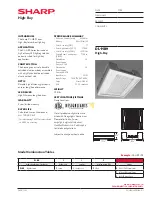
OKSALIS
6
Switching on the projector
- Fig. 7
Press the switch. The projector starts resetting the effects. At the same time, the following information scrolls on the display:
Model Firmware xxx (Fixture ID) System errors
Oksalis Version X.X.X Dmx Address xxx E: .........................
Date - Hour W: .........................
The control panel (Fig. 7) has a display and buttons for the complete programming and management of the projector menu.
The display can be in one of two conditions: rest status and setting status. When it is in the rest status, the display shows the projector’s DMX address
and the Fixture ID address (if set).
During menu setting status, after a wait time (about 30 seconds) without any key having been pressed, the display automatically returns to rest status.
It should be noted than when this condition occurs, any possible value that has been modified but not yet confirmed with the
F
key will be cancelled.
7
Connecting to the control signal line (DMX)
- Fig. 6
Use a cable conforming to specifications EIA RS-485: 2-pole twisted, shielded, 120Ohm characteristic impedance, 22-24 AWG, low capacity. Do not use
microphone cable or other cable with characteristics differing from those specified. The end connections must be made using XLR type 3/5-pin male/female
connectors. A terminating plug must be inserted into the last projector with a resistance of 120Ohm (minimum 1/4 W) between terminals 2 and 3.
IMPORTANT:
The wires must not make contact with each other or with the metal casing of the connectors. The casing itself must be connected to the
shield braid and to pin 1 of the connectors.
SIGNAL
SCREEN
DMX 512
5 PIN
1
2
3
4
5
SIGNAL
SCREEN
1
3
2
DMX 512
3 PIN
SIGNAL
SIGNAL
Mains
5
6
Connecting to the mains supply
- Fig. 5
3.3
Connecting the control signal line: DMX / Art-Net
3.4
Switching on the fixture and basic SetUp
































